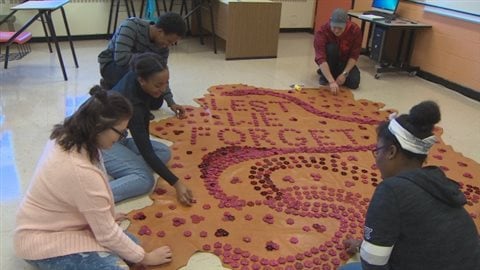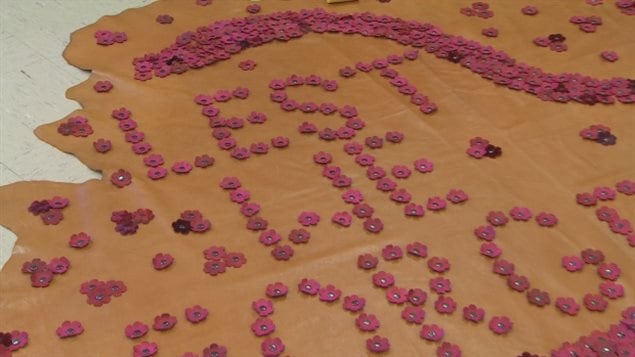Poppies are being worn by many Canadians these days as we move toward Remembrance Day, November 11th, a statutory holiday in Canada.
In Cole Harbour, Nova Scotia, Indigenous students at the high school there created special poppies to honour the contribution of Aboriginal veterans.
“If you did enrol in the military you would completely lose your status, which is a big sacrifice”
Over the last year, the students and their adviser on the project, have cut out hundreds of poppies made from leather, suede and sealskin, to honour the 12,000 Indigenous soldiers who fought in both world wars and Korea.

“Seeing them all come together and work for a common purpose was very rewarding,” Patricia Voisey told the CBC’s Preston Mulligan yesterday. Voisey is the school’s Mi’kmaq Aboriginal support worker.
She visits the school twice a week and describes part of her job as an effort to instill pride among the Mi’kmaq, Métis and Inuit students.
This poppie project brought these Indigenous students together and revealed aspects of their history.
“I asked them, ‘If we weren’t working on this project, would you have been aware that there was over 12,000 First Nations soldiers that fought in Canada’s three wars?’ And they said, ‘No, we wouldn’t have.'” Voisy said.
Student Katie Chase lost her great-grandfather this year. He was an Aboriginal veteran of the Korean War.
She thought of him every day she said, as she and her friends cut out sealskin and suede poppies, and stitched them onto the massive leather canvas.
Chase, who only recently began embracing her Indigenous heritage now understands her great grandfather’s sacrifice.
“If you did enroll in the military you would completely lose your status, which is a big sacrifice,” she said, referring to the federal Indian Act.
“That’s like losing who you are, and they gave that up to fight for your country and that’s one of the biggest sacrifices you can make.”
Voisey said this is a lesson for everyone, not just for her students.
“To give up your status in order to fight for a country that wouldn’t fight for yours, I think that’s something that we need to have a greater discussion about.”
When the Poppy Project is complete it will be on display permanently in the school’s cafeteria and auditorium room.







For reasons beyond our control, and for an undetermined period of time, our comment section is now closed. However, our social networks remain open to your contributions.